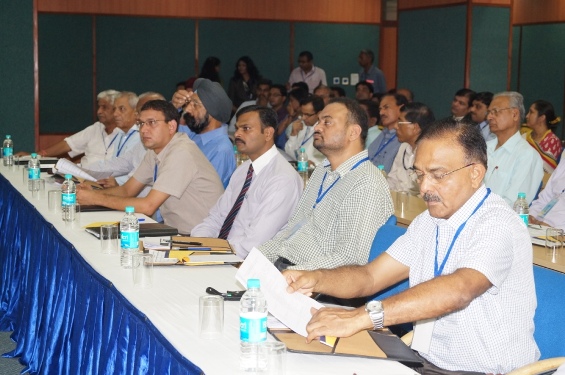20 Sep 2012|Noida | Amity University Campus, Sector-125 Noida
“Police should exercise restraint in its action while handling sensitive situations,” advised Shri K N Sharma- DG, Bureau of Police Research and Development (BPRND) during a workshop on “Safe and Secure Metropolitan Cities” at Amity University

Amity School of Urban Management and Bureau of Police Research and Development started a two day National Level Workshop on “Safe and Secure Metropolitan Cities” at Amity Campus, Sector-125, Noida.
Welcoming the august gathering and talking about the theme, Mr. S.P. Jakhanwal, IAS (Retd.) -Director General, Amity School of Urban Management said that the theme of the workshop is very important, relevant and timely especially keeping in view the changing demographics of India and the entire world. He stressed that metropolitan cities are getting larger and remarked that by 2035, half of the population of India will be in urban India, overcrowding 4, 000- 5, 000 cities and raising safety and security issues. Referring to UN Habitat Report 2007, Mr. Jakhanwal called “Hongkong” and “China” as the most Safest cities of the world and “Port Moresby”, the capital city of Papua New Guinea as the least Safest. Quoting a report, he outlined how America has been able to check its rising crimes since 1992 with the help of “COMPSTAT”, which involves a meeting every seven weeks wherein bureau commanders are grilled by senior panel (often including the police chief himself) on the whys and wherefores of crimes in their jurisdictions. This improved the effectiveness and efficiency of Police in Los Angeles and other cities with similar systems.
Inaugurating the workshop, Shri K N Sharma- DG, Bureau of Police Research and Development (BPRND) appraised the gathering with the functioning of BPRND and its divisions. Referring to the various case studies carried out by BPRND in association with academic institutions, Shri K N Sharma said although there in lot of research done to assess the causal factors behind the major incidences of law breakdown but those research findings are rarely implemented because by the time deliberations are over, people move on, systems and Governments change. “Although there are numerous case studies on the failures of Police but not a single case study highlight the success, prowess and vigor of policemen, “remarked Shri K N Sharma.
Talking about the theme of the workshop, he said that making metropolitan cities safe and secure is a challenging task specially when the city has majority of migrant population which has “railway platform mentality” ie they don’t treat that particular city as their own, at the back of their mind they have plans to go back to their native states and would not even restrain from committing crime to make their “rozi roti”, thereby increasing the crime rate in the city. Citing the example of Surat which has a lot of migrant population from Orrisa, Uttar Pradesh and Bihar and, at one point of time was rocked by large robberies, Shri K N Sharma shared that getting all the migrants photographed at their work places checked the growing number of robberies in Surat.
While referring to the recent incidences of Mumbai and Assam where processions turned violent, Shri Sharma called upon the Police to exercise restraint in its action while dealing with such sensitive situations. Sharing some basic tips to secure the cities and houses, Shri K N Sharma said that while fixing the frame of the window in the houses, ensure that all the 6-7 screws are fixed which will act as a deterrent to many criminals and would keep a check on burglaries.
While identifying the kind of policing required for metropolitan cities, Shri Sharma suggested several measures such as :-
- Identifying Intelligent Security Systems and adopting them after thorough research
- Proactive approach by police to find time for analyzing crime critically
- Promoting Community Policing
- Creating forums to get the innovative ideas of the citizens
- Setting up of separate diagnostic labs like Centres where detached groups could analyze crime and suggest the findings of the report to the police for further action
- Management of information and data sharing with stakeholders without the worry of high secrecy and cnverting the data into meaningful strategies
The inauguration ceremony was followed by plenary sessions wherein latest issues such as “Trends and Patterns of Crime and Violence in Big Cities”, “New Technologies in aid of Urban Police”, “Urban Police, Effectiveness, Image and Visibility”, “Safety of vulnerable groups such as women, elderly and children in metro cities” and many more were discussed by IAS/IPS/IGP officers including Shri. Anand Prakash, IPS –Director (Modernization), Bureau Police Research and Development, Government of India, Shri Surendra Narain Sinha, IPS (Retd.)-Former Commissioner of Police Ahmedabad and Former DGP, Gujarat, Shri D. R Kaarthikeyan, IPS (Retd.)-Former Director, CBI, Shri K. Babu Rao, IPS-Inspector General of Police, CID (Bhopal), Shri Naveen Singla, ACP- Assistant Commissioner of Police, East, Ludhiana City and others.
Shri. K.N. Singh, IPS (Retd.)-Former Additional Director, IB, while sharing his views during a session, said that the first requirement of any human being is safety and security. If some danger comes, it is human psychology to react and if the conflict is inevitble then violence will happen. “Police who are supposed to check the violence has not been able to come up to the expectations of civil society, corruption has come up in Police also and they are have become selfish. No reforms in police can take place unless and until the corruption in the Police is rooted out”, remarked Shri. K.N. Singh